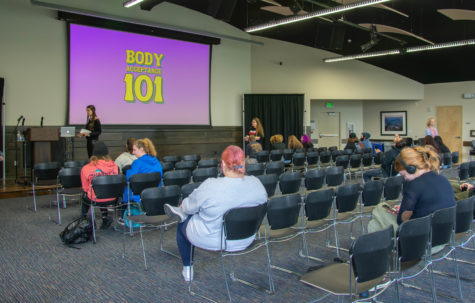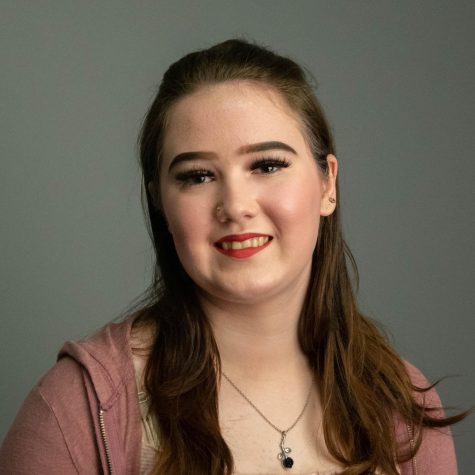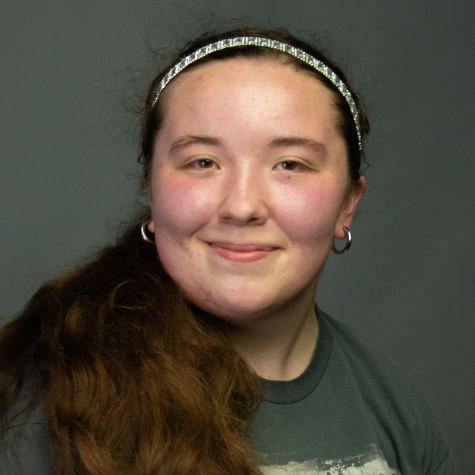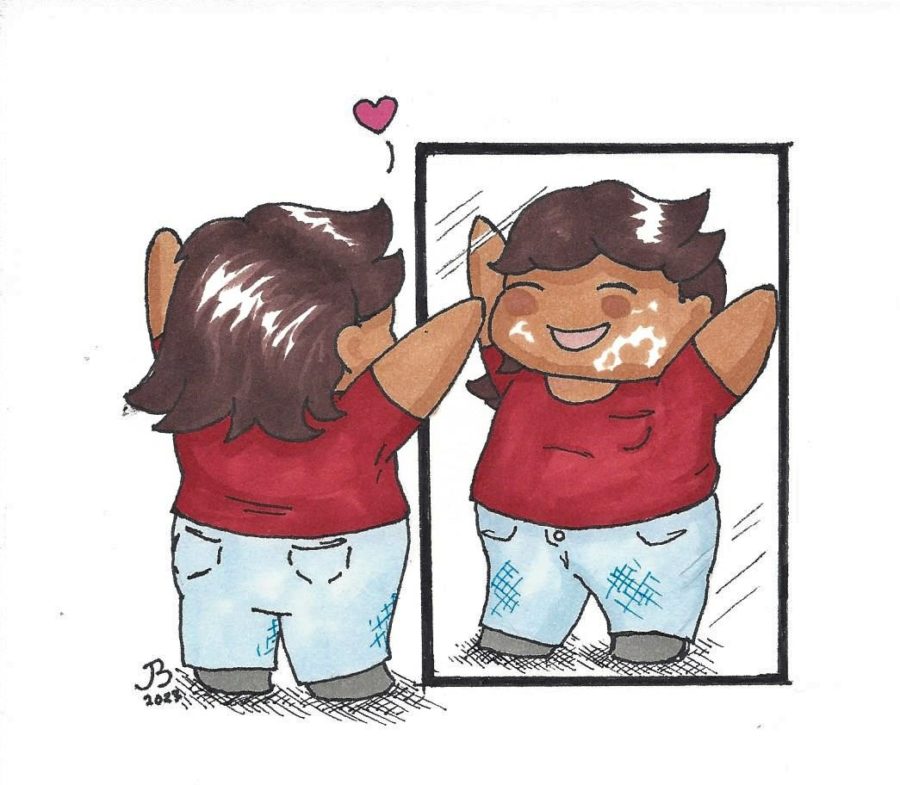EvCC Hosts Event Promoting Body Positivity
Laughter fills the air as students converse with one another in the Henry M. Jackson Conference Center. While waiting for the host, Kacey Spivey, a comedian/actress/nutrition coach, to start the event Body Acceptance 101.
The event was organized and coordinated by TRIO. The event was designed to encourage students to accept and appreciate the bodies they’re given and learn more about eating disorders and body biases that affect our community. Spivey shares her experiences with an eating disorder, along with comedic elements, to educate and not bore the audience.
“If there is anything you can walk away with today it’s this; all bodies are worthy and deserve respect period.” Said Spivey.
The event started with Spivey interacting with the audience, she asked what year students were at the event. To her surprise, it seemed like only a handful of students were officially students at EvCC. “For those who didn’t applaud, I guess you aren’t students here, that’s cool everyone is welcome.” Spivey said.
Spivey then went on to show some photos of before her eating disorder, during and while she was in recovery. “And I just show you these images to illustrate that you probably couldn’t tell by looking at me that I was struggling with anything at all. And that is my point. You can’t tell by looking at someone what they are going through.” said Spivey.
Next Spivey asked the audience to raise their hand if they have ever had a negative thought about your body. Every student and teacher in the room raised their hands. “I love to ask that question off the top just to illustrate that this topic really affects most people.” Spivey said.
To even further illustrate, according to a survey by Glamour Magazine, “97% of women have at least one negative thought about their body image every single day.” A study done by Bradley University revealed that, “ 95% of college age men are dissatisfied with their bodies on some level.” A study done by the National Eating Disorder Association found that, “More than half of LGBTQ+ youth have been diagnosed with an eating disorder at some point in their lives.”
Before Spivey went into detail about eating disorders and body image, she asked if anyone in the room would like to leave. To not embarrass anyone who wanted to do so, she queued up an aerobics dance video and began following the dance moves. A few bold audience members got up and danced along with Spivey to the video but most of the audience just stood up and laughed at each other.

First, Spivey started by discussing how to develop a healthy body image. The first step is that you must understand the basic information. Which are the four aspects of body image. The four aspects of body image are perceptual, affective, cognitive and behavioral.
Perceptual is how you visually see your body. Affective is the feelings you have towards your body. Cognitive is how mentally think about your body. Behavioral is what your actions show about your body.
“A healthy body image can lead to higher self esteem, self acceptance and a balanced lifestyle,” said Spivey.
There are a lot of factors that prevent people from developing a healthy body image. Such as body biases. Body biases are the standards at which society deems a body the appropriate size/weight.
“It is more desirable, healthier, or worthier than other bodies. The problem with body biases is it can lead to ableism, ageism, racism, homophobia, transphobia, sexism, sizeism, xenophobia.” Said Spivey.
First, Spivey discussed sizeism or specifically weight biases. Society has deemed that a muscular or thin physique is the desirable or healthy weight people should have. These biases can be dangerous because it promotes the internalization of these stereotypes. This can then affect mental health as a healthy body image is detrimental in having good mental health.
One of the leading factors in promoting body biases is social media. “There is so many messages about weight loss, dieting, and fitness. They make you feel like you have to do these things in order to be happy and successful.” Spivey said.
Another factor that plays into body biases is advertising through social media platforms. The idea of advertising is to develop a product that is desirable in the eyes of consumers. This is accomplished by solving a daily problem that may or may not affect people’s lives.
“For example, women did not shave their body hair until Gillete (shaving company) realized they could double their money by selling razors to men and women. So they began running ads in magazines convincing women that body hair was embarrassing.” Said Spivey.
Some other brands or products that can lead to body biases include; shapewear, male enhancement drugs, weight loss, gyms, makeup and wrinkle cream. All these brands advertise a product that is supposed to help you get that “dream body” or to feel accepted by those around you. These brands poison the public into believing that the results people are getting from these brands is something they must acquire to be deemed acceptable by society.
“I want to illustrate that the weight loss supplements, just supplements industry is worth 254.9 billion dollars. Hair growth 86 billion. Plastic surgery 68 billion. Fitness industry 33 billion. Male enhancement 220 million.” Said Spivey.
Now that being said, you shouldn’t not use these products, because of this information. Instead recognize how the advertising makes you feel. If advertisement makes you feel unworthy or not good enough, notice that feeling and remember, “Don’t let businesses tell you what you’re worth. Use the product great. Shave your pits great. Just don’t do it because you are feeling like you won’t be worthy unless you use the product. It’s not true.” Said Spivey.
Full disclosure, the information about to be provided is meant to educate and not to diagnose. If any of this information relates to you then seek further guidance from your doctor or reach out to the following resources that will be provided in this article.
An eating disorder ranges on a spectrum; healthy behavior, unhealthy, disordered eating, and a diagnosis of an eating disorder. Healthy behavior is eating breakfast, lunch and dinner everyday. This also includes eating food because of hunger and not feeling shameful for eating. You would also exercise regularly and have a positive self esteem.
Unhealthy behavior is dieting or restricting the intake of food without the guidance of a healthcare professional. You may also feel dissatisfied with your body and constantly feel the need to lose weight. You frequently think about food and obsess over dieting.

Disordered eating is frequent unhealthy eating habits, food restrictions/limitation of food intake, extreme dieting and exercise. This can include binge eating and the restriction of calories/nutrients. These behaviors can create feelings of shame or distress about eating and high levels of body dissatisfaction.
It’s important to keep in mind that an eating disorder is a mental illness. The American Psychiatric Association states that, “Eating disorders often co-occur with other psychiatric disorders most commonly, mood and anxiety disorders, obsessive-compulsive disorder, and alcohol and substance use disorders.” Since eating disorders often coexist with other physiological disorders and disrupt the brain’s daily functioning; it is classified as a mental illness.
All that being taken into consideration, you may be asking yourself what’s the difference between disordered eating and having a clinically diagnosed eating disorder? “The difference is obsession. So when I was struggling with my eating disorder it was like my life was playing in the background. And I was only focused and very obsessed with counting, weighting and measuring. And I was using these rituals as a way to self soothe and as a way to feel control over something when my life felt out of control.” Said Spivey.
The American Psychiatric Association defines an eating disorder as, “Behavioral conditions characterized by severe and persistent disturbance in eating behaviors and associated distressing thoughts and emotions. They can be very serious conditions affecting physical, psychological and social function.”
Some eating disorders include anorexia, this is self starvation and has one of the highest mortality rates. Binge eating is when you consume large amounts of food in a brief period while feeling unable to control or stop eating. Bulimia is when you repeatedly consume large amounts of food then purge the food by exercising or vomiting. Avoidant Restrictive Food Intake is when you restrict your intake of food while feeling little to no distress about body shape/size.
All of these eating disorders can result in bone loss, gastrointestinal disturbances, electrolyte and fluid imbalances, low heart rate and blood pressure, increased anxiety, depression and social isolation. These conditions can be potentially life threatening and can impede the quality of life an individual may have.
Warning signs that an individual with an eating disorder may display is; appearing to be uncomfortable eating around others, constant fluctuation in weight, behaviors or attitudes that indicate dieting is all that matters/lying about the food consumed, changes in menstrual patterns, refusal to eat certain foods, life revolves around eating habits and withdrawal from friends and loved ones.
Some other warning signs that may not be as obvious as the signs listed above include; sensitivity to be challenged about eating habits, frequent mood changes, swelling of the face and neck, low energy/loss of appetite, sensitivity to comments about nutrition and fitness, low self esteem, difficulties concentrating, fainting/dizziness, brittle hair and nails.
If someone you know displays any of these signs, talk to a trusted adult or medical professional. You can also call or text this hotline that has been organized by the foundation NEDA Feeding Hope to receive advice from an educated advisor. (800) 931-2237
Allison Werling, TRIO faculty counselor at EvCC, discusses some of the resources students have available on campus. “However there are also counselors on campus that students who are not in TRIO can work with. If you want to reach out to me and I can put you in connection with those folks, that is totally fine.”
If you or someone you know is interested in receiving the free counseling services at EvCC, then you can email the EvCC counseling services [email protected]. The counseling appointments are available via zoom, phone, and in person. The counseling building is located in the Parks Student Union center on the 3rd floor. The office hours are Monday through Thursday 9 am to 4:30 pm. Friday they are open from 9 am to 12 pm. Spivey also mentioned that the counseling services can also connect you to other resources if you need help with something like an eating disorder.
One of the biggest concerns people seem to have is what if the person I’m concerned about isn’t willing to get help or admit they have a problem? “In that situation I think the biggest place you can lead from is a place of caring, a place of empathy. And just like reminding them gently of resources. That would be the place that I would come from. Again, you are not responsible for making them go or kind of working through those things.” Said Werling.
“If you know someone who might be struggling and you just need advice and more specific advice for your situation. You can always reach out to someone too, you don’t have to push them, you can call yourself and be like my person is struggling and I need help. And they can give you some great specific advice as well.” Said Spivey.
As the event came to an end and students chatted amongst each other discussing all the information that they had received. One student, Cassandra Boulter said that, “I really like learning how to help people, it’s important to know.”
If you are someone you know is struggling with an eating disorder you can contact the NEDA Feeding Hope hotline or you can reach out to treatment facilities such as THIRA Health (425) 403-7715 and Eating Recovery Center (866) 488-1863 to receive treatment or advice. For more information about eating disorders visit the National Institutes of Health website for a detailed analysis.

What interests you about journalism?
What interests me the most about journalism is upholding our right to the first amendment, writing meaningful stories...

When you aren't doing things for the Clipper, what can you be found doing?
I can usually be found in the forest photographing anything interesting....








